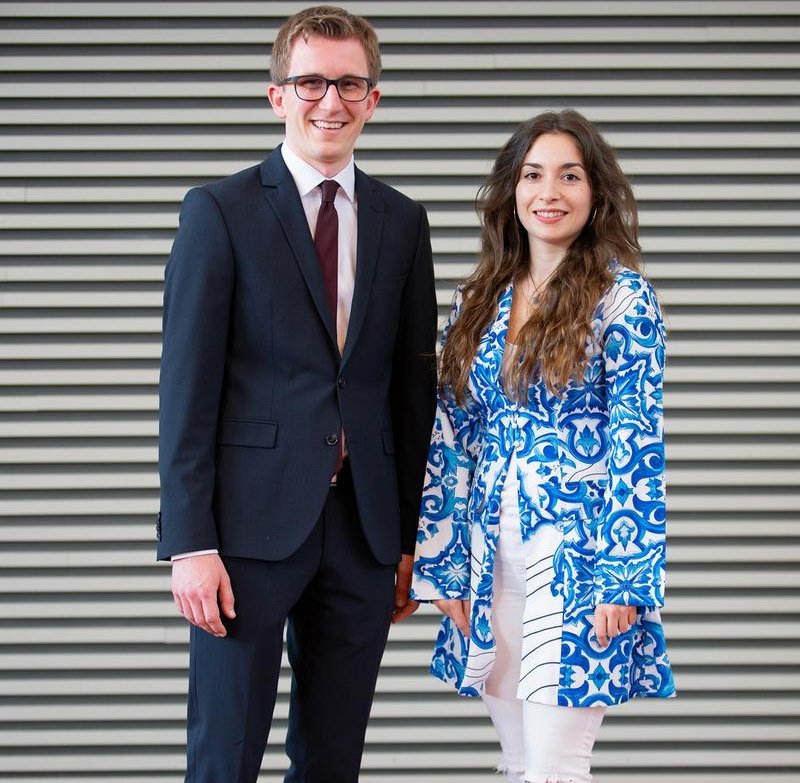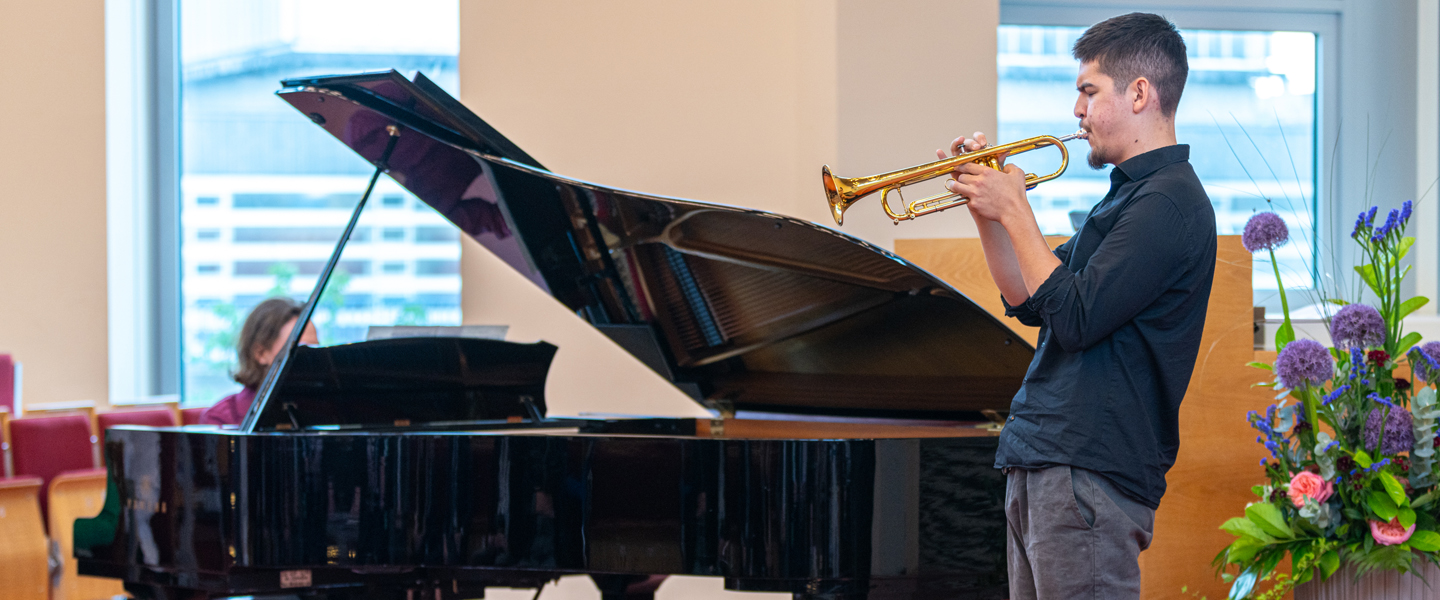Awarding of certificates and two prizes: Doctoral ceremony at the MHH.

The two doctoral award winners (from left): Dr Thorben Pape and Dr Bibiana Costa with their doctoral certificates. Copyright: André Schweigler / MHH

Of course, the graduation ceremony was also accompanied by music. Copyright: André Schweigler / MHH
The joy at their success and the doctorate was clear to see for the 169 doctoral students at Hannover Medical School (MHH) at the doctoral ceremony on Friday. "It's nice to see so many happy faces at once. Their good mood is infectious," said Professor Dr Frank Bengel, Dean of Research at the university, sharing his delight.
All subjects represented
Since November 2023, the MHH has awarded a total of 169 doctorates to 117 female doctoral students and 52 male doctoral students. These include all of the university's subjects: 86 female and 45 male doctors, 14 female dentists, twelve female and three male natural scientists, five female and two male human biologists and two doctoral students in population medicine (public health). A total of 27 of them graduated "with honours", and two received the doctoral prizes of the Society of Friends of the MHH e.V., each endowed with 2,500 euros, as outstanding awards.
MHH President Professor Dr Michael P. Manns presented the doctoral certificates to the doctoral candidates during the ceremony in Lecture Hall F. Together with Dean of Research Professor Dr Frank Bengel, Professor Dr Siegfried Piepenbrock, Chairman of the Society of Friends of the MHH e.V., then honoured the two doctoral award winners for their outstanding research work: Dr Thorben Pape (26), a doctor in further training at the Clinic for Pneumology and Infectiology at the MHH, and Dr Bibiana Costa (31), PhD graduate at TWINCORE, Centre for Experimental and Clinical Infection Research, a joint institution of the MHH and the Helmholtz Centre for Infection Research (HZI).
Why sepsis leads to multiple organ failure
Dr Thorben Pape successfully completed a translational-experimental dissertation entitled "Modulation of the permeability-inducing factor angiopoietin-2 using bifonazole in systemic inflammation" in the working group of Professor Sascha David, MD, Department of Renal and Hypertensive Diseases, during a scholarship in the structured doctoral programme (StrucMed). The research group is investigating why blood poisoning (sepsis) leads to massive permeability of the blood vessels and thus to multi-organ failure. The research group is focussing on a molecule called angiopoietin-2, which triggers problematic vascular permeability when released into the blood.
The doctoral student screened already authorised drugs for side effects that influence the release of angiopoietin-2 and was able to identify the antifungal drug bifonazole (BIFO). This relatively old drug reduced the release of angiopoietin-2 in endothelial cells both at rest and after stimulation with various inflammatory messengers. In addition, bifonazole was able to reduce inflammation-induced vascular permeability in the experimental cell model. Dr Pape also investigated the underlying mechanism of action. Dr Pape also investigated the underlying mechanism of action. His findings are of high translational relevance, so that a clinical trial is already planned. It should show whether this relatively harmless drug can actually reduce angiopoietin-2 levels and thus stop the permeability of the vessels. The results have been published in the scientific journal "Shock":
Pape T et al. Modulation of the Permeability-Inducing Factor Angiopoietin-2 Through Bifonazole in Systemic Inflammation. Shock. 2021 Dec 1; 56(6):1049-1056.
HCM virus in focus
Dr Bibiana Costa wrote her PhD thesis in biochemistry entitled "Analysis of pro-anti-viral responses of cytomegalovirus stimulated human myeloid cells" at TWINCORE. The doctoral student worked on a project involving the single-cell RNA sequencing of human dendritic cells infected with the human cytomegalovirus (HCMV). HCMV is a human-specific pathogen that infects between 60 and 90 per cent of people. An infection is usually inconspicuous, but in immunocompromised people and especially in patients who have undergone a transplant, the pathogen can cause life-threatening illnesses. The virus is able to infiltrate the immune system and also infect immune cells such as dendritic cells (DC).
The doctoral student investigated whether the expression of certain genes in dendritic cells influences susceptibility to an active HCMV infection. She discovered that monocyte-derived dendritic cells (moDC) consist of different cell subsets that are differently susceptible to HCMV infection. By identifying patterns of expressed genes (DEG), Dr Costa was able to formulate a putative mechanism of how HCMV manages to productively infect these immune cells.
She was able to decipher the interaction of several host genes that have either a pro- or antiviral potential, thus contributing to the fact that only a small percentage of cells become productively infected after HCMV exposure of moDC. The results of her doctoral thesis contribute to a better understanding of the interactions between HCMV and the human immune system and pave the way for the development of new therapeutic interventions. Their relevance was highlighted by a publication in the journal "Nature Communications": Costa, Becker et al. Human cytomegalovirus exploits STING signalling and counteracts IFN/ISG induction to facilitate infection of dendritic cells. Nat Commun 15, 1745 (2024). https://www.nature.com/articles/s41467-024-45614-3
Text: Bettina Dunker